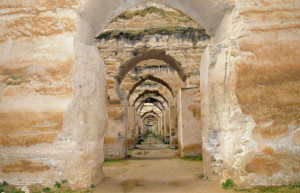Meknes is one of Morocco’s former royal cities, along with the better known Fes, Marrakech and Rabat. Meknes is famous for buildings erected by a seventeenth century ruler who fancied himself the equal of French King Louis XIV and holds a world record for virility.
Moulay Ismail ibn Sharif, claiming to be a descendant of Muhammad, became the Sultan of Morocco in 1672. Ismail moved his capital from Fes to Meknes and set about erecting palaces and other buildings to match his image of Versailles. He reportedly used 25,000 slaves in his projects, many of them Europeans captured by Barbary pirates operating from Moroccan ports. Some of the building materials may have been plundered from Volubilis, a nearby city with buildings dating to the time of the Romans.
Ismail’s famous stable housed 12,000 horses under a single roof supported by stone arches. Three long corridors intersected at the entrance, allowing one attendant to monitor all the horses simultaneously. An enormous granary adjoining the stable stored grain at controlled temperatures to enable both the horses and the residents to survive a long siege. A wheel inside the granary pulled water from an underground stream. When construction at Meknes was completed, fifteen miles of walls surrounded the city. Ismail, who led huge armies of soldiers from sub-Saharan Africa against his rivals, reportedly placed 10,000 skulls atop the walls to warn prospective attackers.
Ismail maintained good diplomatic relations with Louis XIV, but was rebuffed in his effort to marry Louis’s daughter. Not to worry. Ismail had enough wives and concubines to sire at least 867 children. Because of his military successes and his buildings at Meknes, Moulay Ismail is considered one of Morocco’s greatest rulers despite (or perhaps because of) his reputation for ruthlessness.
A 1755 earthquake destroyed many of the buildings in Meknes and Ismail’s successors moved the Moroccan capital to Marrakech. The stable and granary have been partially restored and they, along with Ismail’s mausoleum, are open to visitors. Ismail’s record for fathering the most children of any man in history remains untouched.

Comments are closed.